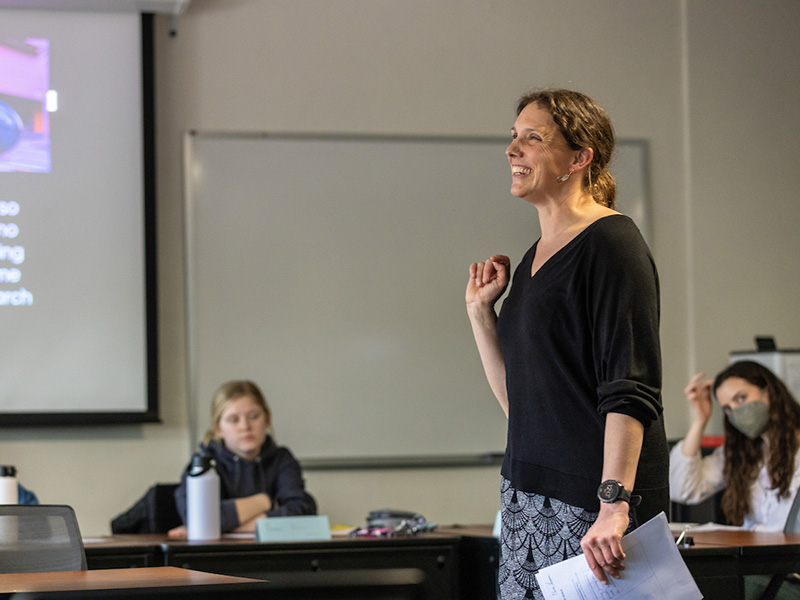CELT Notes
CELT Notes is the Center for Excellence in Learning and Teaching's monthly newsletter to Luther faculty. Each issue includes teaching tips, programming info, and reminders about events and resources on campus.
Latest Issue of CELT Notes
December 17, 2025
Gather, Grade, and January programming
Note from Assistant Director, Christy Vrtis
Hi, all.
Fall semester is wrapping up, and I just want to say: congratulations! We made it! As you finish up your end of semester work, CELT will offer a few opportunities to gather together and get some work done (with food and beverages).
The first will be a drop-in sandwich bar lunch during our grading party on Thursday, December 18. The sandwich bar will be open from 11:00 a.m.- 2:00 p.m. in the CELT Conference Room, Valders 242. We will have a variety of bread/rolls (including gluten free), meat, cheese, sandwich toppings, chips, fruit, dessert and drinks available.
The Grading Party will run concurrently in the CELT Office, Valders 240. Erin and Christy will be around to help, as needed.
CELT will host one more grading party to help you get your grading done before the start of the holidays on Monday, December 22 from 9:00 a.m.–3:00 p.m. in the CELT Office, Valders 240. Snacks and beverages will be available throughout the day.
Reminder: Grades are due on December 29 at 10 a.m.
Work with our Instructional Designer, Rick Harber
Do you wish you had a tech-savvy guru to help you re-design a course for Summer or Fall 2026? Rick Harber, our Instructional Designer, can help design your KATIE page, course materials and more, and, speaking from experience, he is a lovely human who is wonderful to work with! If you are interested, or want more information, please reach out to me!
Merry Christmas and Happy Holidays!
Warmly,
Christy
1:1 Consultations | vrtich01@luther.edu | Valders 240 | 563-387-1587 | Mobile: 804-201-1688
January CELT Programming
Upgrade Your Syllabus Design, facilitated by Erin Zidlicky and Christy Vrtis
Wednesday, Jan. 7, (CELT Conference Room, Valders 242 and online via Zoom): 11:00 a.m.-12:00 p.m. – Do you have a syllabus for Spring Semester in desperate need of an overhaul? Join Erin and Christy for an interactive workshop where you will learn some tips and tools for making your syllabi more inclusive, accessible, and engaging for your students. Participants will work on one of their syllabi during the workshop, so please bring laptops and ideas!
Register for upcoming workshops here.
Adobe Express Basics, facilitated by User Services Specialist Key McCain.
Thursday, Jan. 15, (CELT Conference Room, Valders 242): 11:00 a.m. – 12:00 p.m. – Want to create eye-catching graphics without being a designer or using Canva? This hands-on workshop introduces the basics of Adobe Express, a tool that is free for all Luther faculty and staff, for creating graphics, presentations, flyers, social media posts, and short videos. Participants will learn how to navigate the interface, customize templates, add text and images, and quickly produce polished materials. No prior design experience required—just bring your ideas and leave with designs you can use right away.
Perfect for faculty and staff who want fast, accessible design tools for classes, events, and communications.
Note from Instructional Designer, Erin Zidlicky
January is a perfect time to stop by CELT and visit Erin!
Grab some coffee, bring your questions, or your wild ideas. I can help you:
- Start fresh (seriously—don’t import that old course!)
- Set up your Spring gradebook without headaches
- Rethink assignments—AI-proof, AI-friendly, or just more engaging
- Match your teaching ideas with the right tech
- Explore how KATIE can support your goals
Let’s make your spring courses sparkle before Week 1 even begins.
Erin will be in CELT 9 am – 2 pm on January 12, 13, 20, 22, and 29. Or email zidler01@luther.edu for a time that works best for you.
Note from Director of Community Based Learning, Britt Rhodes
Invitation to join a Community of Practice spring 2026!
A community of practice is a small group learning experience where individuals who share an interest come together to share knowledge and experience. CoPs aim to enhance capacity for community engagement through research, resources and collaboration.
This spring SEED Coalition will be offering TWO communities of practice (CoPs) for faculty and staff at member schools in Iowa and Minnesota (an impressive list, including Luther):
Beyond Recidivism: Reconsidering the Value and Purpose of Higher Education in Prison and Community-Engaged Learning: Deep Dive (Scroll down on the same page!)
These are great opportunities to learn with colleagues from other schools around community engaged learning and civic engagement.
Informal CELT Programming
Informal Programming is paused until February.
CELT Notes Archives
Looking for all the issues of CELT Notes? Check out the archives! All CELT Notes issues have been saved for your reference.
Contact Info
Christy Vrtis
Assistant Director of CELT
Instructor in Paideia
Luther College
700 College Drive
Decorah, IA 52101
Phone: 563-387-1587
